How to prepare for an online interview
Do all the standard interview preparation
How to prepare for an online interview
Mistakes to avoid in an online interview
Online interviews are here to stay
The last two years have been nothing short of unbelievable. As I sat around the Christmas table in December 2019, chatting and laughing about what the next year would bring, I would have gotten some very strange looks if I had laid out what the preceding months and years were to look like. A global pandemic?! What even is a pandemic? Social distan…-what? Oh social distancing – 1.5 metres, got it. Not able to leave our houses without a mask and working exclusively from home indefinitely.
Ummm excuse me, did I hear you right? And locking down whole cities and countries for months on end, don’t even get me started on all the repercussions that brought about. As I said, truly unbelievable.
Fast forward 2.5 years and life is slowly returning to normal. Not normal as we once knew it, but a ‘post covid normal’. The scars will take time to heal and upon reflection, there are some positives to come out of recent times. Front of mind – workplace flexibility and the significant increase in conducting online interviews.
Online interviews are here to stay – they are cost-effective, time efficient, convenient and flexible. Online interviews are a foreign concept for many, and even if you are an online interview whiz, here are some tips, and a few ‘do not’s’ to consider before you next press ‘join meeting’ for your interview.
Do all the standard interview preparation
When you attend a job interview, the interviewee is looking for more than just your skills and experience.
- They want to know if your values and working style align with the company culture. This can help them determine if you’re a good fit for the organisation.
- It is a good idea to take some time to research the company before your interview, as well as re-read the selection criteria and your application, so that you can make sure to discuss relevant strengths, weaknesses and career history that will be aligned with the company and the position description.
- You may even like to make a list of key strengths and specific examples for each criterion to help you with your responses.
How to prepare for an online interview
Being interviewed over Zoom, MS Teams or Google Meet is different than meeting in person, but that doesn’t mean you can’t shine in the meeting. To make sure your next video interview is the best it can be, I’ve collected some tips from experts who have done both online and in-person interviews.
Before the online interview:
Get your tech organised
Make sure you have a laptop, tablet, or smartphone and video meeting software installed. If needed you might need to create an account to log in and use the software.
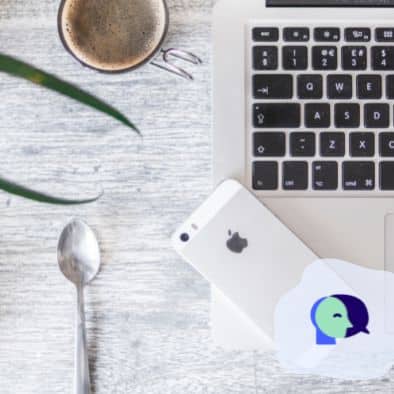
It is also important to have a strong internet connection to support video so that you don’t have any technical glitches during the interview.
If the meeting is on Zoom, download the app, don’t just rely on the browser.
If you are using MS Teams or Google Meet, again download the app. However also be conscious of the Gmail account you are using to log in with. Is it the one you set up when you were 14? cutiebabe123@gmail.com – you don’t want your interviewer to see this. I can only imagine the awkward silence when the interviewer sees this pop up!
Make sure your ‘profile picture’ is appropriate, or just leave it blank. Remember this is not social media.
Test Your Gear
Before your interview;
- Test your internet connection
- Become comfortable with the meeting software that you’ll be using. Ask the interviewer (or the individual setting up the interview) what application they will use.
- Make sure you can hear and be heard and see and be seen on the software.
- Have a friend video chat with you to test it out.
- Familiarise yourself with the program and make sure you know how to mute and unmute your microphone.
- Make sure your headphones can connect to the device you will be using.
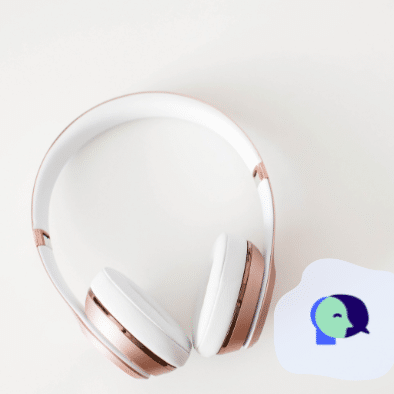
Before the interview, it’s important to do things like put your phone on aeroplane mode and close other applications, so you’re not distracted by notifications. You should also make sure your laptop and telephone are charged or plugged into power.
Lighting
Lighting is key when you’re trying to make a great first impression in an interview. To make sure you put your best foot forward, avoid having any light sources directly behind you– this will make your image darker and harder for the interviewer to see.
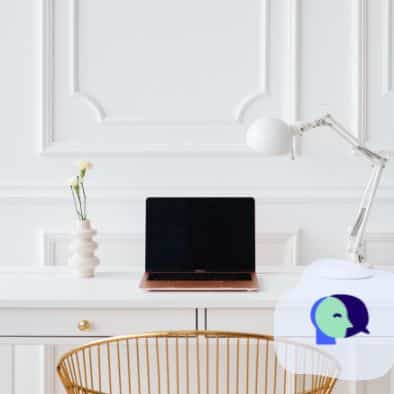
Side lighting can be tricky too, because it can cast shadows on half your face. The best lighting set-up is to have a light source in front of you so that your face is evenly illuminated.
A ring light that can clip onto your monitor is a great solution or alternatively, sit facing a window. If you have a lamp, place it directly in front of you so the light hits your face evenly.
Camera angle
Having a good camera angle is important for two reasons. First, it ensures that people can see your face clearly during presentations or calls. Second, it makes you look more professional and confident.
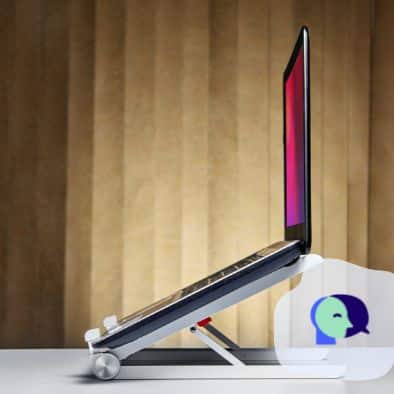
Most people put their laptop directly on the table which means your camera is much lower than your eyes. Use a laptop stand or a couple of thick books underneath your laptop to raise the camera angle to be at eye level.
Background
Your workspace can speak volumes about your personality and work habits.

A cluttered or messy space may give the impression that you’re disorganised, while a blank or sterile space may make you seem uninteresting. The best setting for your interview is in front of a bookshelf or in an office, as this will show that you’re well-read and have a working knowledge of the industry.
Be sure to tidy up your space before your interview, and make sure there are no distractions or interruptions.
During the online interview:
Eye Contact and Looking at the Camera
It is important to maintain eye contact with the person who is interviewing you, whether it is in person or over a video call.

Not only does it show that you are respectful, but it also shows that you are engaged in the conversation.
One way to improve your eye contact during a video call is to focus on the camera, not the screen. This will help your eyes align with the interviewer’s eyes on the other end.
When you’re listening, you can look back at the screen.
Body language
Body language is one of the most important aspects of a job interview, as it can tell the interviewer much more than what is said. It can show if the candidate is confident and motivated – or if they seem bored, nervous or uninterested.

Some simple things to remember to communicate positive nonverbally during an interview are to keep an open body position, make eye contact, and smile.
Avoid: Crossing your legs or arms, as this could come across as defensive or insecure. Also, do not slouch!
Do: Try to relax and be comfortable. Hand gestures during the conversation are ok, but try to avoid fidgeting or playing with objects like a pencil.
Technical Difficulties
Before the interview, get the contact information for your interviewer in case you have any technical difficulties. If the video connection is lost, you can call them to continue the interview over the phone or, to reschedule.
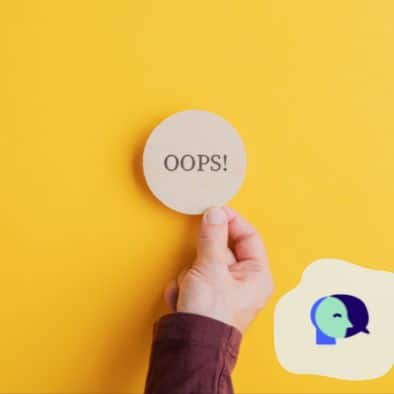
Hot tip – If the sound isn’t working, or it’s a little glitchy, you can both mute the computer and turn off the mics. Then have the phones on loudspeaker – still with the video going. This can work really well, and you will look like a tech wizard if you suggest it and it works.
Exit the call
At the conclusion of your interview, make sure you don’t do anything until you know for certain that you have hung up and left the meeting!
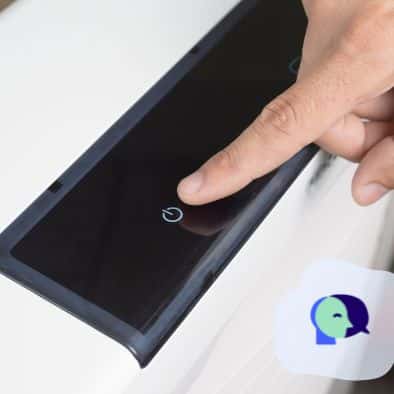
I would also turn your mic off, disconnect your headphones and shut down your computer…. Just to be on the safe side.
Mistakes to avoid in an online interview
It is important to be aware of the common mistakes people make during online interviews, so you can avoid them. Here are some to be mindful of:
- Waiting until the last minute to connect, be early, just like you would in person
- Sound/microphone issues, test them beforehand
- Poor internet speed, have a backup – maybe you could hotspot your phone
- Distractions in the background such as pets or people walking past – go to a quiet location
- Having a messy room – you can blur out your background on Zoom, MS Teams and Google Meet
- Bad camera angle
- Not having the appropriate interview clothing
- Poor lighting
- Speaking too fast
- Not treating it as a formal interview, and more informal.
As always – Prepare for Success
Being well prepared for your interview, even if you have minimal experience is key to outshining the competition and getting that job offer. Spending a small amount of time and effort beforehand could make the difference between a smooth interview and a disaster!
As with any job interview, be sure to research the company ahead of time, so you can ask informed questions and demonstrate that you’re a good fit for the role.
Try to elaborate and give specific answers, while also keeping your responses to the point. Lastly, it is important to conclude the meeting by restating your interest in the position, confirming next steps and timelines and thanking the interviewer for their time. Here’s to landing that next great role!
******************************
Written by Emma Moore. Based in Bayside in Melbourne, Emma has spent 15 years in Corporate Talent Acquisition roles in global organizations across Consulting, Professional Services and Telecommunications. Emma has tertiary qualifications in Psychology, Business (Human Resource Management) and Careers Development and Education. Emma has read and provided feedback on thousands of resumes, interviewed hundreds of candidates and made those all important hiring decisions with her stakeholders. Emma is in a unique position to enable you to represent yourself in the best possible way. She knows exactly what prospective employers like to see and hear throughout the application and interview process as a result of being ‘on the other side of the fence’ for so many years.
Want to work with Emma? Contact her today to set up a CV, Resume, LinkedIn or Interview Coaching session.


